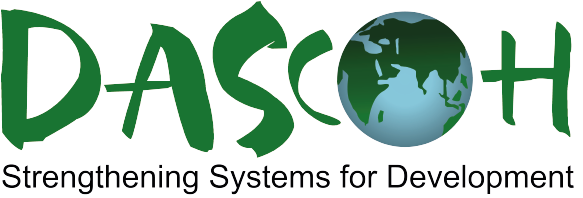
Social mobilization help improve service quality at CC, UH&FWC & USC
Porsha and Sapahar are two upazila with approximately 293,887 populations under Naogaon, one of the northern districts in Bangladesh. 29 community clinics and 10 union health and family welfare center from these two upazilas have been included in the DASCOH Foundations’ “Public Health Improvement Initiative Rajshahi” since 2017 to improve the maternal, neonatal and child health status of the population. Strengthening social accountability through community mobilization is one of the approaches of the project, which was challenging initially to start with, with a high potential to improve with remarkable changes that could be exemplary to follow.
Lack or shortage of adequate properly trained human resources at the facilities was one of most tricky challenges the project faced, and this was both persistent and global in nature for a developing country like Bangladesh. Some of the other challenges like lack of emergency drugs, medicine or logistics supply, were being addressed through different forums and channels with the omnipresent support of the health and family welfare ministry and its directorates or departments. PHIIR project also channeled efforts through community engagement to increase and strengthen social accountability mechanism to involve the local government institutions to take part in solving the crisis. Through patience and perseverance, gaps in the key position of Family Welfare Visitor (FWV) at 5 of the union centres that were vacant were filled up in 2020. Through advocacy, DASCOH was able to convince both the local government institutions and specific facility management committees to jointly contribute to raise funds to support these positions, until government authorities deploy through their revenue channel.
Photo title: Mrs. Sayera Khatun, Aya at Patari Union Health and Family Welfare Centre
After deployment of FWVs in the facilities, all of them started conducting normal deliveries except Tentulia USC where the labor room is not properly functional. But at the same time, it was also perceived that the support staff or Aya position is an absolute necessity and very important for the facilities cleanliness, hygiene and to provide essential support during normal delivery as well. So, support for an Aya position for each of UH&FWC/USC of Porsha and Sapahar upazila were planned by the LGI and project jointly where the position is vacant.
While brainstorming for raising funds for this position, a social safety net program called the Vulnerable Group Development (VGD) program under the Ministry of Women and Children Affairs (MOWCA) of government of Bangladesh was identified. Under the VGD program, a card is allocated to a woman in the ultra-poor and jobless households to help them to meet their need, helping them to graduate out of poverty. Currently about 750,000 women participants (about 3.75 million beneficiaries) from ultra-poor households receive a monthly food ration of 30 kg of rice for 24 months (a two- year cycle) combined with a package of development services. This is one of the sustainable development initiatives of GOB and is conducted by LGI like Union Parishad at subnational level.
So, a mechanism was proposed, whereby all stakeholders agreed that once motivated candidates for the Aya position is identified, she will be offered a VGD card as a remuneration package for her required services at the facility, provided she is willing, jobless and physically fit to work. Thus, in the year 2020, 29 Ayas were deployed at the CCs where the position is not sanctioned by the GOB approved HR structure, but is essential for quality service environment. Its noteworthy to mention that the position was proposed & created through discussions at the CG & CSG level which are also results of the previous phase’s work.
Through this informal but sustainable recruitment, the LGIs and the FMCs have created a standalone exemplary solution for addressing HR challenge through utilizing local resources, and this is now being replicated in the adjacent unions and upazilas.
Sayera Khatun from Kolmudanga village, Patari union was interviewed by our project staff at the centre. She was very grateful to the UP, both for selecting her for the job and for providing her with the VGD card. She said, “This has opened up a new life with lot of opportunities for my whole family, which I never dreamt off, without a husband I was a destitute, leaving on others mercy. Now, both my sons are going to school, I have food at home and this card has allowed me access to small loans, with which I have bought hens and goats, and I have a job to go to daily. I can’t even express what it has changed for me.”
FWV Sonali Khatun, also expressed her satisfaction with the current arrangement for the Aya. She mentioned, “No one realizes that even as a union level health facility, what kind of a workload we bear every working day. To get someone to clean up after working hours is a blessing, as it feels really wonderful to open up and set shop in a clean facility in the morning. Praise the UP and hope this continues.”




